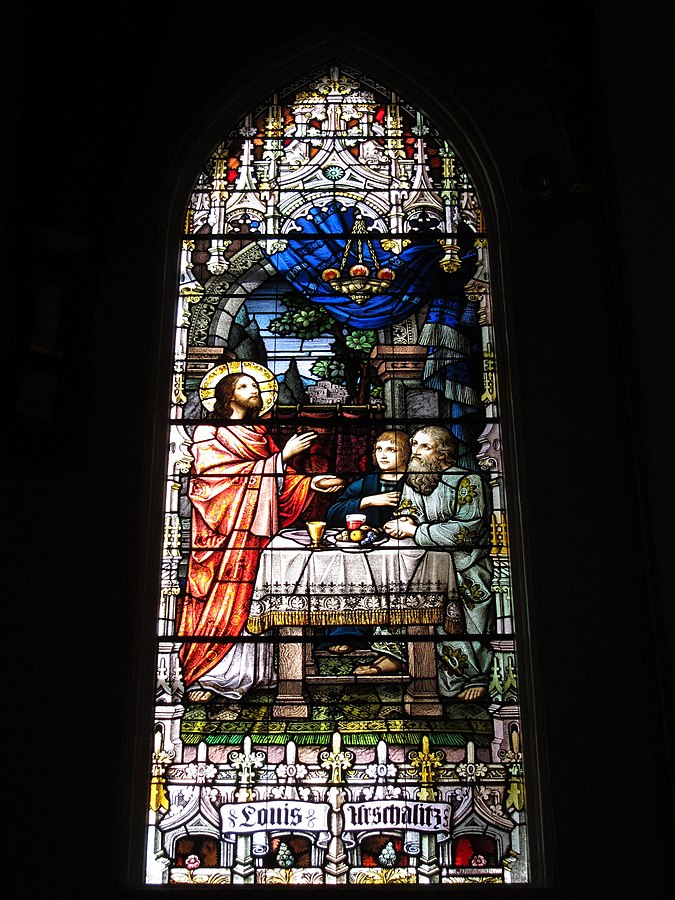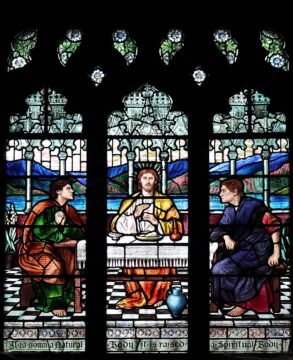Franciscan Friar Fr. Paul Gallagher reflects on the Gospel readings for the Third Sunday of Easter. Do recall experiencing a time when your emotions seemed contradictory or even all over the place?
The content is edited by Franciscan Sister of Christian Charity Sister Anne Marie Lom and Joe Thiel. The excerpts from the Sunday readings are prepared by Joe Thiel. To read or download the complete pdf with excerpts for your prayer, please click here Francisccan Gospel Reflections April 14 2024. Excerpts are from the Lectionary for Mass for Use in the Dioceses of the United States of America, second typical edition © 2001, 1998, 1997, 1986, 1970 Confraternity of Christian Doctrine, Inc., Washington, DC. Used with permission. All rights reserved. No portion of this text may be reproduced by any means without permission in writing from the copyright owner. Photos: Nheyob, CC BY-SA 3.0 <https://creativecommons.org/licenses/by-sa/3.0>, via Wikimedia Commons; Nheyob, CC BY-SA 3.0 <https://creativecommons.org/licenses/by-sa/3.0>, via Wikimedia Commons
Luke 24:35-48
Then the two recounted what had taken place on the way and how he was made known to them in the breaking of the bread. While they were still speaking about this, he stood in their midst and said to them, “Peace be with you.” But they were startled and terrified and thought that they were seeing a ghost. Then he said to them, “Why are you troubled? And why do questions arise in your hearts? Look at my hands and my feet, that it is I myself. Touch me and see, because a ghost does not have flesh and bones as you can see I have.” And as he said this, he showed them his hands and his feet. While they were still incredulous for joy and were amazed, he asked them, “Have you anything here to eat?” They gave him a piece of baked fish; he took it and ate it in front of them. He said to them, “These are my words that I spoke to you while I was still with you, that everything written about me in the Law of Moses and in the prophets and psalms must be fulfilled.” Then he opened their minds to understand the scriptures. And he said to them, “Thus it is written that the Messiah would suffer and rise from the dead on the third day and that repentance, for the forgiveness of sins, would be preached in his name to all the nations, beginning from Jerusalem. You are witnesses of these things.”
Background:
Last week’s Gospel was taken from John’s account of Jesus’ appearance to the disciples after the resurrection. In that Gospel, Jesus appeared to the disciples twice. The first time, Thomas was not present. The second time, Thomas was present with the others.
This Gospel text from Luke is not from John nor Mark’s Gospel. Because Mark’s Gospel is the shortest, the Church draws on Luke’s text from time to time during year B of the cycle, which is primarily Mark. The Emmaus story from Luke is read on the third Sunday of Easter during year A of the cycle. Today’s Gospel text completes the Emmaus story. (Luke 24:13-32). In the Emmaus story Luke states that the two disciples encountered Jesus on “that very day” that the women, Peter, and the beloved disciple had been to the tomb and found it empty. The first line in today’s Gospel refers to those two disciples telling the others of their experience of Jesus on the road and in the breaking of the bread.
Here Jesus greets them with the customary greeting of the day, “Peace be with you.” They are startled and terrified, even thinking that Jesus might be a ghost. Jesus first tries to assure them that he is a real flesh-and-blood person by inviting them to touch him, and then by eating fish. Having reassured them of his corporal reality, Jesus reassures them that he is truly the promised one. He refers to passages in the Law, the Prophets, and the Psalms that point to his suffering and death. Their minds are opened to the profound meaning of their religious tradition. Luke does not tell the reader which passages Jesus referred to that day. Again, Jesus greets them with “Peace be with you.” His reaction to their fear and lack of faith is to demonstrate his physical presence and show them that he is the same person who was betrayed, condemned, and crucified. He also reminds them of his instructions to them. Jesus also makes clear to them that they are to be his witnesses. This commission to witness has been fulfilled already by the fact that two of them had returned from Emmaus with the news of what had taken place.
Reflection Questions:
1. Do recall experiencing a time when your emotions seemed contradictory or even all over the place? (Perhaps a time of transition for yourself or a close companion, taking an initial step toward dealing with a major issue or addiction, etc.)
2. How does having questions or being troubled affect your relationship with those close to you? Is that also true for your relationship with God?
3. Can you recall any scripture passages where people are in transition in their life or relationship with God?
4. The disciples have witnessed the crowds greeting Jesus as he entered Jerusalem, his rejection by their religious and civil leaders, their own betrayal, Jesus’ public death on the cross, and his burial. What are some of the things that they might be feeling at this point in their lives?
5. What are some of the things the disciples might be discovering about their relationship to Jesus during this period?
6. Are there things that you have discovered about your faith in those difficult times of faith in your own life?
7. At the end of the Gospel text, Jesus tells them “you are witnesses of these things.” How do you respond to these words of Jesus?
8. Can you take some time today to talk with God about this Gospel text, Jesus’ desire to show the disciples that he is real, his statement that they are his witnesses, or some other aspect of your relationship with God that arises from this text?




